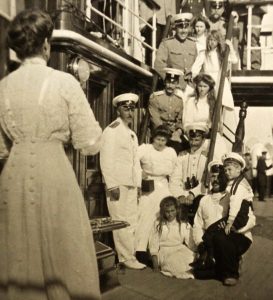 We are exceedingly pleased to announce a recent gift from Katherine Kyes Leab, of Washington, CT–an almost complete set (nearly 600 volumes) of first- or early issues of the first series of The Modern Library (1917-1970), most of which are in very good condition and have their dust jackets. This collection adds materially to our 20thC literary holdings, as a study collection for modernist literature, publishing, and criticism.
We are exceedingly pleased to announce a recent gift from Katherine Kyes Leab, of Washington, CT–an almost complete set (nearly 600 volumes) of first- or early issues of the first series of The Modern Library (1917-1970), most of which are in very good condition and have their dust jackets. This collection adds materially to our 20thC literary holdings, as a study collection for modernist literature, publishing, and criticism.
“In the 1920s the Modern Library achieved an honorific cultural status unparalleled in reprint publishing, equivalent to that enjoyed simultaneously by America’s ‘intellectual’ magazines and experimental theater troupes . . . [and] despite the deepening Depression, in 1930 it sold over a million books. What had begun in 1917 as a publishing venture designed for self-consciously ‘modern’ bohemian intellectuals found an extensive new audience after Bennet Cerf and Donald Klopfer bought the series from Horace Liveright in 1925.”
“The Modern Library’s origin as a self-consciously subversive literary purveyor to America’s fledgling Greenwich Village intelligensia established its early critical success . . . From 1925, when Cerf and Klopfer took control of the series and began to apply new marketing strategies, to the start of World War II, the Modern Library sustained a period of healthy growth as it rapidly expanded into new markets. Its distribution and sales methods in the early 1930s foreshadowed the era of the mass-market paperback, and it became the cornerstone of Random House, perhaps the most financially successful publishing firm of the twentieth century. This period was crucial in the development of the modern concept of culture and it saw a dramatic reformulation of the country’s book trade.”
[Jay Satterfield, The World’s Best Books: Taste, Culture, and the Modern Library (U. of Massachusetts Press, 2002), “Introduction”].
Comments Off on Modern Library comes to the Watkinson!
 March 8 is the 100th anniversary of the beginning of “February Revolution” in Russia (the Russian Empire still used the Julian calendar at the time, so to them it was February 23, but to most of the rest of the world, it was March 8 (Gregorian calendar)). On this day workers engaged in demonstrations protesting the government of Tsar Nicholas II and clashed with police and the military. On March 12 soldiers in the Russian army joined the workers resulting in the abdication of the Tsar on March 15.
March 8 is the 100th anniversary of the beginning of “February Revolution” in Russia (the Russian Empire still used the Julian calendar at the time, so to them it was February 23, but to most of the rest of the world, it was March 8 (Gregorian calendar)). On this day workers engaged in demonstrations protesting the government of Tsar Nicholas II and clashed with police and the military. On March 12 soldiers in the Russian army joined the workers resulting in the abdication of the Tsar on March 15.
In 2001 Henry Fuller ’38 donated his collection documenting the Romanov family including photographs of Tsar Nicholas and the Tsarina Alexandra, and their family during the last years of Nicholas’ rule, and extensive correspondence between Fuller and Alexandra’s close friend Anna Virubova.
Theresa Battaglio, a graduate student in American Studies, recently mounted an online exhibit using the collection. The Watkinson Library encourages people to come in and view this unique resource as we commemorate this important date in history.
[The Tsarina taking a picture of the family aboard their yacht.]
Comments Off on 100th anniversary of the “February Revolution “… in March!
 March 8 is the 100th anniversary of the beginning of “February Revolution” in Russia (the Russian Empire still used the Julian calendar at the time, so to them it was February 23, but to most of the rest of the world, it was March 8 (Gregorian calendar)). On this day workers engaged in demonstrations protesting the government of Tsar Nicholas II and clashed with police and the military. On March 12 soldiers in the Russian army joined the workers resulting in the abdication of the Tsar on March 15.
March 8 is the 100th anniversary of the beginning of “February Revolution” in Russia (the Russian Empire still used the Julian calendar at the time, so to them it was February 23, but to most of the rest of the world, it was March 8 (Gregorian calendar)). On this day workers engaged in demonstrations protesting the government of Tsar Nicholas II and clashed with police and the military. On March 12 soldiers in the Russian army joined the workers resulting in the abdication of the Tsar on March 15.